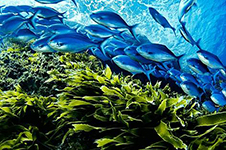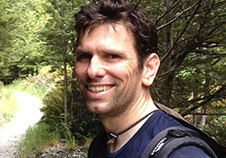 Department of Anatomy researchers Dr Michael Knapp and Professor Neil Gemmell have won one of only eight Sustainable Seas National Science grants worth $300,000.
Department of Anatomy researchers Dr Michael Knapp and Professor Neil Gemmell have won one of only eight Sustainable Seas National Science grants worth $300,000.
Their project aims to establish and test an innovative, high-throughput and cost efficient strategy for quantifying marine biodiversity using environmental DNA (eDNA).
eDNA is the traces of DNA organisms leave in their environment. Feces, mucus, gametes, shed skin, carcasses and hair are all sources of eDNA . eDNA is extracted from environmental samples such as water or soil, not from individuals, and has the potential to detect a wide range of organisms that are present in that environment. This is a huge advantage over current sampling methods that are labour intensive and rely on surveys of a limited number of indicator species to provide an estimate of biodiversity and ecosystem health.
The research team will work closely with the Department of Conservation, the Ministry of Primary Industries and kaitiaki (Māori guardians of the sea) to develop simple, web-based tools to explore the country's eDNA data so that scientists and non-scientists will be able to readily access the information to undertake their own research, and make informed management decisions.

"Our project will establish a new standard for quantifying marine biodiversity and empowering long-term ecosystem-based management of New Zealand's marine resources.” Dr Knapp.
The aim of the Sustainable Seas Challenge is to enhance the use of New Zealand's marine resources and help New Zealander's better understand and manage the oceans around us. “We asked for innovative ideas that would bring new ways of doing things that involved industry and communities coming together to apply their thinking in a way that has not been seen before", said Challenge Director Dr Julie Hall, when announcing the eight grants, of which the eDNA project is one.
The project team includes PhD student Gert-Jan Jeunen (Anatomy), Co-Investigators Dr Chris Hepburn and Dr Federico Baltar from the University of Otago's Marine Science Department, and Professor Mike Bunce from Curtin University, Perth.
This research, along with a number of other conservation based projects, further enhances the Department of Anatomy's reputation as the home of Conservation Genomics.
More information on this story can be found at http://www.otago.ac.nz/genetics/news/otago620007.html
NOTE: Sustainable Seas is one of 11 National Science Challenges which represent “significant mission-led investments that focus on defined issues of national importance”. They are overseen by the Ministry of Business, Innovation and Employment.